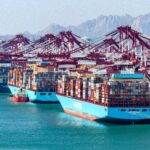- New IMO framework mandates net-zero emissions from shipping by 2050, applying to vessels over 5,000 gross tonnage—responsible for 85% of the sector’s CO₂ emissions.
- Dual compliance strategy includes global fuel standards and a carbon pricing mechanism, incentivizing cleaner operations and penalizing high emitters.
- IMO Net-Zero Fund will channel revenues toward innovation and infrastructure in developing nations, easing the transition for vulnerable economies.
Global maritime shipping is poised for a transformative shift following a landmark agreement reached by the UN International Maritime Organization (IMO). The newly approved framework sets the sector on course for net-zero emissions by 2050, with full implementation scheduled for 2027.
The regulations, which apply to large ocean-going vessels over 5,000 gross tonnage, cover approximately 85% of the sector’s carbon emissions.
“The approval of draft amendments to MARPOL Annex VI mandating the IMO net-zero framework represents another significant step in our collective efforts to combat climate change, to modernize shipping and demonstrates that IMO delivers on its commitments,” said IMO Secretary-General Arsenio Dominguez.

The deal amends MARPOL Annex VI, a global treaty addressing air pollution from ships, and already binding on 97% of the world’s merchant fleet by tonnage. It introduces a two-pronged strategy:
- A global fuel standard that will incrementally lower the annual greenhouse gas intensity of marine fuels.
- A carbon pricing system requiring high-emitting vessels to purchase remedial units to offset emissions, while rewarding near-zero and zero-emission ships with financial incentives.
The agreement follows intense negotiations in London, where opposition from around a dozen countries—including the U.S.—led to a vote.
To ensure equitable implementation, the IMO will establish a Net-Zero Fund to channel revenue from carbon pricing into research, innovation, and infrastructure in developing countries. The fund will also mitigate economic disruptions for Small Island Developing States (SIDS) and Least Developed Countries (LDCs).
Formal adoption of the framework is expected in October 2025. If ratified, the rules will come into force by 2027, offering the industry a critical runway to adapt and invest in sustainable technologies.
Follow ESG News on LinkedIn
The post UN Maritime Agency Adopts Global Shipping Fuel Standard and Carbon Pricing Rule by 2027 appeared first on ESG News.
